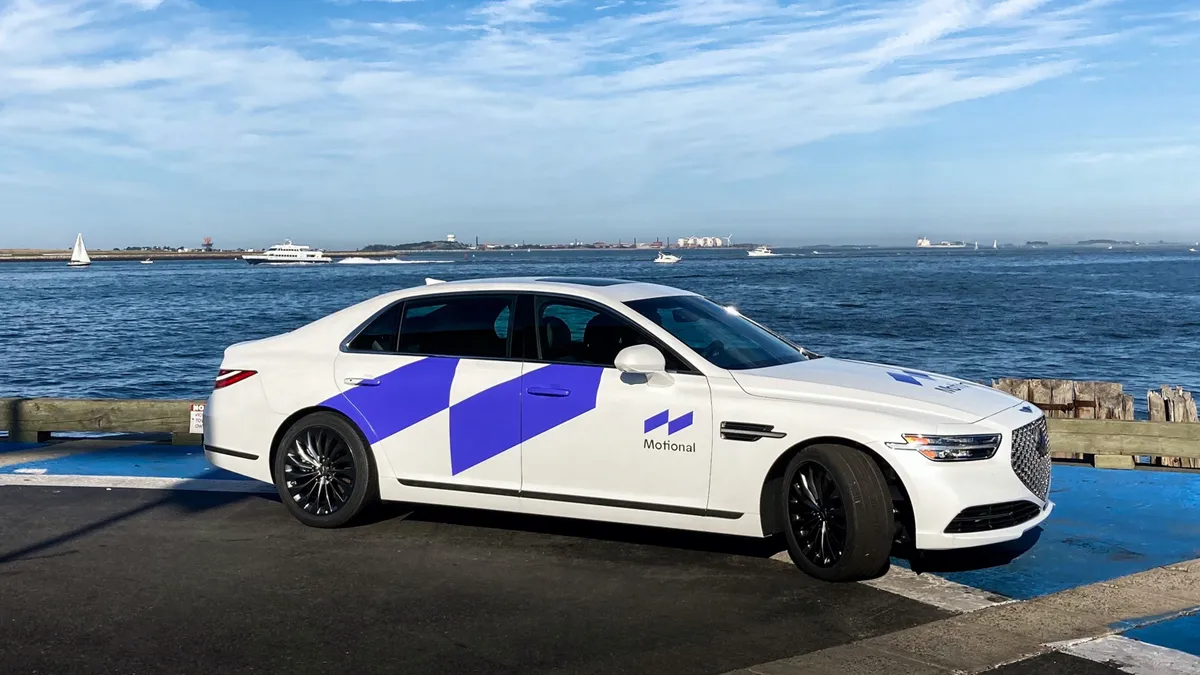Dive Brief:
- Nearly one in five Americans (19%) are more interested in autonomous vehicles (AVs) now than before the onset of the COVID-19 pandemic, according to a new survey from driverless technology company Motional.
- The Motional Consumer Mobility Report surveyed 1,003 U.S. consumers in mid-July to find public enthusiasm toward driverless vehicles is generally growing. The survey responses show:
- 62% of respondents believe AVs are "the way of the future"
- 65% agree safety is the most important factor of an AV
- 54% believe driverless cars could increase transportation access for underserved communities
- 69% believe COVID-19 has changed how cities should be planned
- 84% believe access to safe, clean transportation is a public health issue
- The report also indicates widespread consumer misunderstandings, with 45% of respondents believing there is no difference between AVs and vehicles with driving assist features. "That surprised me," said Motional CTO Laura Major, noting it is the industry's responsibility to help the public "understand this technology, what it can do, what it can't do and how it can help them in their future."
Dive Insight:
Consumers have increasingly realized the importance of accessible, safe and socially distanced transportation options amid the pandemic, Major said, citing the survey findings. "There’s been a growing awareness and interest in autonomous systems in general as we face this new world where we can’t necessarily do things in the same way that we did in the past," she said.
This is a stark contrast to a pre-pandemic survey that found 48% of consumers would "never" get in an autonomous taxi or ride-sharing vehicle. That survey, conducted by Partners for Automated Vehicle Education (PAVE), polled 1,200 Americans between Feb. 27 and March 5, just before the widespread effects of COVID-19 hit the U.S.
Major said the pandemic has caused conversations around autonomous driving systems to "happen more broadly" than before, which she believes has opened consumers' eyes to the benefits of AVs.
Motional CEO Karl Iagnemma teased this new wave of consumer AV awareness during a webinar last month, in which the Motional brand was unveiled. "Whether we like it or not, transportation decisions have become emotional decisions," he said, adding that Motional's work "is more relevant and more important than ever" amid this increased interest in innovative transportation.
Motional, the newly formed joint autonomous driving venture from Hyundai Motor Group and Aptiv, conducted this survey to "better understand consumer perceptions of our technology," Major said. She referenced Motional's access to local insights through its autonomous driving work with Lyft in Las Vegas (an effort formerly run under the Aptiv name), but said the company was seeking a national pulse on consumer perceptions.
The report made clear the importance of consumer education efforts among industry leaders, with results showing a "striking" difference in enthusiasm among consumers who are "extremely knowledgeable" about AVs and those who are less knowledgeable. "We found through this survey that until you see it, it's hard to believe it," Major said of consumers' AV experiences.
To improve the safety perception of those who are not as educated on driverless systems, Motional partnered with a number of OEMs and technology providers to develop Safety First for Automated Driving, a 157-page white paper that provides a comprehensive summary of safety measures and verification and validation (V&V) methods across level 3 and level 4 automated driving systems.
Motional also recently expanded its nuScenes datasets to provide a more open and transparent look into the development of its systems. This mirrors recent efforts from the National Highway Traffic Safety Administration (NHTSA) to encourage data-sharing among industry and governments through its AV TEST initiative. Motional has not participated in these voluntary efforts.
Autonomy will not be a silver bullet to solving pedestrian safety, said Los Angeles Department of Transportation (LADOT) General Manager Seleta Reynolds in a recent webinar. She said local governments will need to work with industry to ensure "the same intelligence and nimbleness" is built into transportation policy and innovation on the public side.












